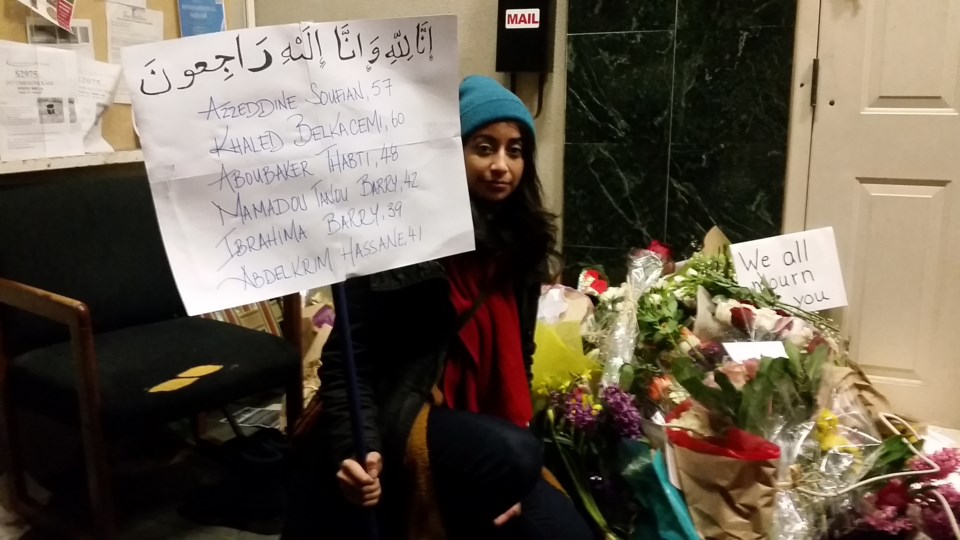More than 100 people gathered at tiny Jamia Masjid, a mosque tucked away on West Eight Avenue, near Cambie Street, on Saturday evening for a candlelight vigil. Some held wax candles. Others held signs. Many had tears in their eyes, and all were bundled up outside the mosque’s front steps, as they gathered to commemorate the victims of the Quebec mosque shooting.
“We all mourn with you,” said a sign atop a mound of bouquets at the mosque’s entrance. And, mourn together, everyone did.
A diverse group of Vancouverites were at the event to remember the six worshippers who were shot at a mosque in Quebec City at the end of January. In addition to Muslim mourners, the speakers included an Indigenous woman who played a rhythmic song on a traditional drum and a rabbi who blew a ram’s horn that symbolized a “wake-up” call. Afterwards, many headed downtown for a rally against Islamophobia, which drew an estimated 1,500 people.
The vigil and rally were among dozens of similar events that took place across Canada last week. Thousands of Canadians came together, including on Parliament Hill, to express their grief and concern.
I’m embarrassed to say that this response shocked me. I didn’t realize so many non-Muslims cared enough about Muslim lives to respond to the terrorist attack in this way.
I wasn't the only one feeling surprised.
“I was actually in shock just seeing how many people came and their willingness to actually come into the mosque as well,” said Faria Khan, a Muslim UBC student from Calgary, after the vigil in Vancouver.
“I’ve never seen it like this before,” said Aasim Rashid, one of the event organizers and the founder of Al Ihsan, an organization that runs educational programs about Islam for non-Muslims.
“Obviously, we know, as Canadians, we don’t stand for stuff like that. We don’t stand for violent extremism,” he added. “But for the masses to get together at this scale and express their solidarity with victims and with oppressed people — it’s really heartwarming.”
As for me, I’m uncomfortable that I feel so surprised. I love how multicultural Canada is, that Canadians stepped up in large numbers to help Syrian refugees. I don’t feel as though I’m discriminated against in my day-to-day life, including when I’m out and about as a reporter speaking to Canadians from all walks of life. (Though I know that the experience can be different for Muslim women who wear a headscarf. I don’t.)
But 9/11 happened when I was 14, and I’ve grown up feeling like I have to explain that my religious beliefs are about peace, not hate, that I can stand for women’s rights AND practise my faith. I regularly confront news that says otherwise.
The last federal election is a case in point. I was troubled when the Conservative party made the niqab an election issue, but it simply reaffirmed the biases I saw around me.
“The only time we’re in the news media is when we’re being held up as an example of how we don’t integrate,” said Farah Malik, a Muslim lawyer, in an interview after the vigil. “We don’t hear about the good work that masjids do in the community or that the Muslim food bank does.”
It makes me sad that, after years of mainly hearing news reports about Muslim terrorists and concerns about Muslims’ values and integration, I lost sight of how much my fellow Canadians care.
But the events of the last few weeks, from huge protests against U.S. President Donald Trump’s “Muslim ban” to the smaller candlelight vigil in Vancouver, have also reminded me how powerful it is to be physically present — to step out with our bodies to show what we believe in.
And that’s something that can be easy to forget — that, in an era when influence is often measured by how quickly and widely something spreads on social media, it is our offline interactions that may actually mean the most.
alia.dharssi@gmail.com
@alia_d



